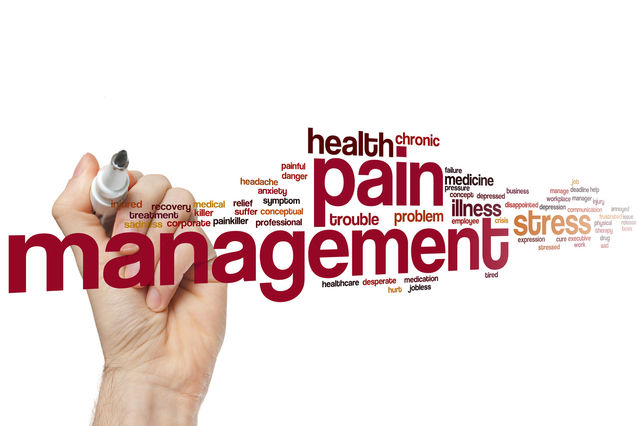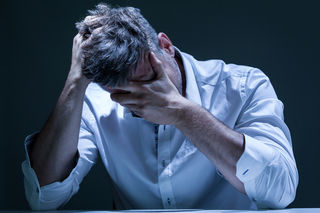
We all know that it is unpleasant to live with pain. What we don’t know, however, is how to manage our pain. We try to avoid pain, but we don’t always do it in the most appropriate way.
Nowadays, we know that many types of pain are produced by the brain, no matter what part of the body is injured, or what kind of pain it is. The brain is a central reception that handles pain.
Pain may be acute or chronic.
Acute pain is produced by damage to tissues and it usually lasts for a few weeks or even a few months. This pain is generated when you hurt yourself, such as when you twist a foot. Usually, doctors recommend that people stay active as much as possible as time helps the healing process.
But when the pain continues after healing, it becomes persistent or chronic. The brain continues to produce pain even when the body is healed. Then it becomes a much more complex pain; the person feels that they have not recovered even though there are no physical explanations for the pain. The reason is that our highly sensitive nervous system continues to react.
Even though one feel powerless in the face of pain, there are many things that can be done to combat it. Traditional medicine undoubtedly helps, but it is not the only option. There are many methods that doctors use to reduce pain, from the application of ice or heat, body creams, TENS therapy, in addition to typical injections, medication, and surgery. Unfortunately, narcotics have proven to be harmful due to the risk of becoming highly addictive.
When pain is chronic, options become limited. However, there is still a lot one can do. This does not mean that the pain is non-existent or that everything is in our head. To clarify, we are talking about a neurological process that determine our reactions, but whose mechanism we can learn from and influence to our benefit.
We need to consider the kind of life we live. Many of us spend most of our days sitting down in a vehicle, in an office, or at home. This puts extraordinary pressure on our back. Many others stand all day, abusing the legs that when we were younger, did not realize were mistreated. Additionally, modern life is simply full of stress. Financial and familial concerns, a lack of leisure time, and a volatile political climate creates further tension in a body that needs a break.
Pain is our body’s way of informing us that something is wrong.

We must pay attention to it. The way we live, combined with what we eat, affects our central nervous system, which affects our perception of pain. If we add other factors, such as smoking, drinking, or the consumption of other drugs, we have to ask ourselves why we willingly harm ourselves. Some say that marijuana can lessen the severity of pain. Although that could be the case, marijuana use may also lead to health-related complications. Studies repeatedly prove that marijuana use increases the chances of developing a cardiac arrhythmia. Also, there are neurological consequences that affect our ability to think. There are also another 400 chemicals associated with processing it, and 10% of its consumers develop an addiction. In fact, marijuana helps to calm anxiety, and therefore, a user may sleep better and their tension and pain may be relieved. However, there are other ways to get the same benefits without exposing oneself to the harmful effects of marijuana use.
In general, unless your doctor says it is contraindicated, staying active is part of the plan. Many people are so afraid of pain that they recuse the time they are active. By remaining stationary, their pain increases. One’s level of activity should increase little by little. We should allow our bodies to set a limit, and little by little, push our bodies. Doctors do not tire of recommending walking. This is a simple activity that does not involve any expenses, but has multiple benefits. A good idea is to create a plan of activities for each day, get up at the same time, and ensure that all tasks get completed, without exaggerating unnecessary pressures. Sleeping well is very important. When we do not receive adequate and uninterrupted sleep, our body undergoes more tension and a person becomes more irritable.
Pain significantly impacts our lives.
It limits how active we are, which, in turn, leads to stress and frustration. Understandably, pain produces a pessimistic perception of one’s future. We may feel as if pain will permanently permeate our lives. We may feel deceived by our doctors. We may even be angry with ourselves for being unable to reduce our suffering. In turn, we sometimes reflect on our past actions. We wonder what we have done to deserve our pain. Anxiety and depression are common responses to pain, which, unfortunately, intensify our suffering.
Our thoughts affect the way we feel. Given that, be mindful of your thoughts. Negative thoughts can be a form of physical and emotional torture. Keep in mind that pain does not kill us. Pain is a sign or a message you should heed. Seek help when you are in pain. Pain is not something with which you should struggle. The more you fight with your pain, the more pain you will have.
Understand your pain.

Learn to deal with it through relaxation exercises, deep breathing, meditation, prayer – whatever it is that brings you peace. However, don’t believe everything you think, as our thoughts are sometimes deceiving. Review your thoughts and you will see how reality can distort what you think, which generates unnecessary stress, which in and of itself, creates further tension and affects our perception of pain.




